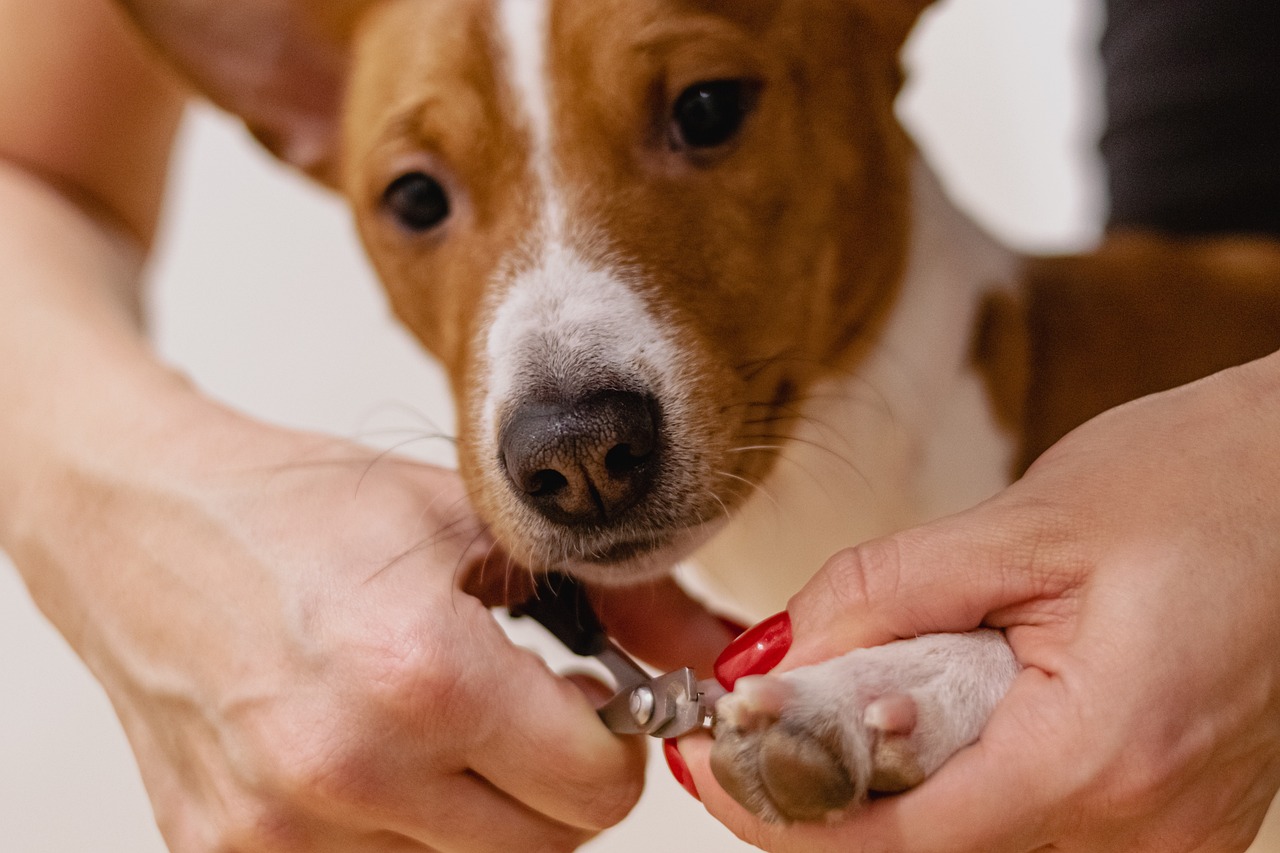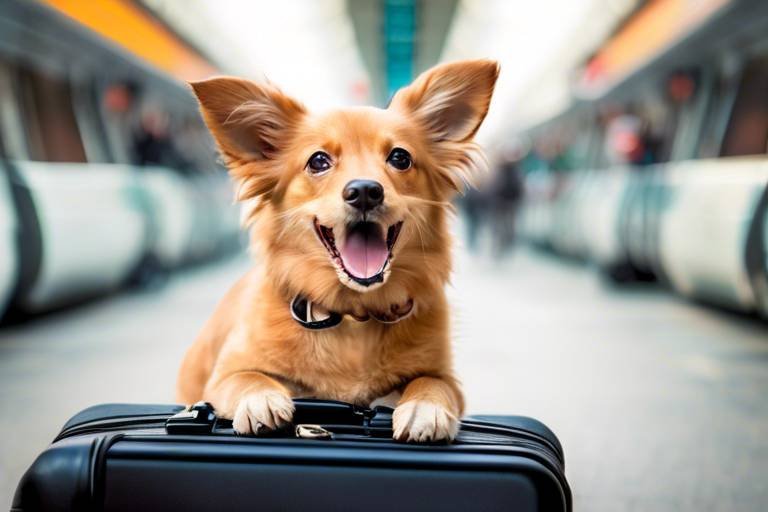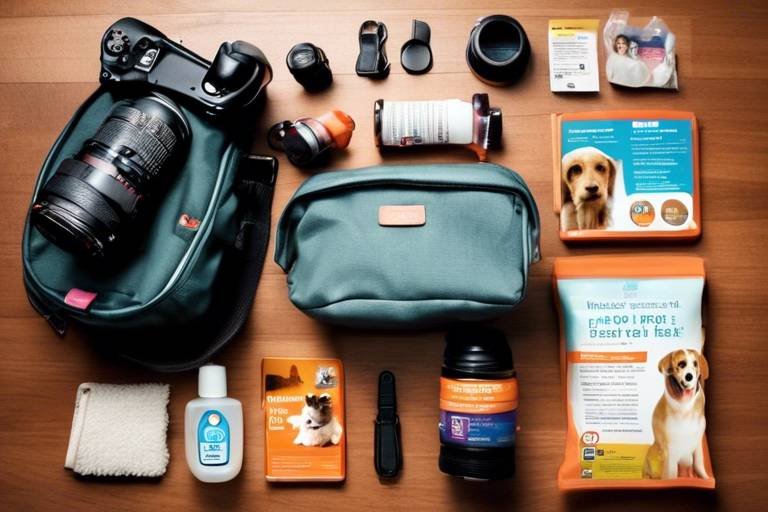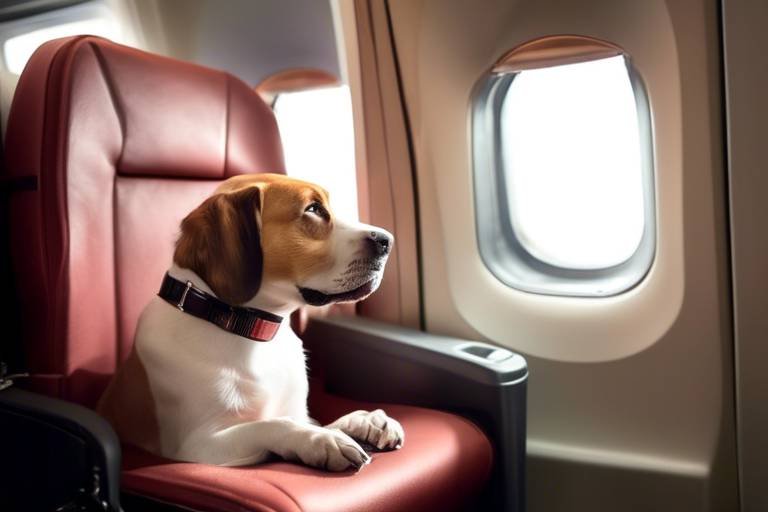Traveling with Pets - Legal Considerations You Should Know
Traveling with your furry companions can be one of the most rewarding experiences, but it also comes with its own set of challenges and legal considerations. Just like humans, pets have specific needs and regulations that must be adhered to, ensuring a smooth journey for everyone involved. From understanding pet travel regulations to ensuring proper documentation, every step is crucial for a hassle-free adventure. Imagine embarking on a road trip or flying across the globe with your beloved pet, only to face unexpected hurdles at the airport or border. By being informed and prepared, you can avoid such pitfalls and enjoy the journey to the fullest.
Different countries and regions have specific regulations regarding pet travel. Familiarizing yourself with these laws is crucial to avoid fines or quarantine. For example, did you know that some countries require pets to be microchipped before entry? Others may have strict rules about certain breeds or species. It's essential to do your homework, as regulations can vary widely from one place to another. Ignorance of the law is not an excuse, and being caught unprepared can lead to your pet being denied entry or, worse, placed in quarantine. This can be a traumatic experience for both you and your pet, so understanding the legal framework is your first step to a successful trip.
Proper documentation is vital when traveling with pets. This includes vaccination records, health certificates, and identification tags, which help ensure your pet's safety and compliance with regulations. Think of these documents as your pet's passport; without them, your furry friend might not be able to join you on your adventures. It's not just about legal compliance; it's also about ensuring your pet's health and safety. For instance, if your pet were to fall ill while traveling, having a health certificate could expedite medical treatment.
Many destinations require proof of vaccinations. Ensure your pet is up-to-date on vaccinations to avoid complications during travel. Vaccination records serve not only as proof of compliance but also as a safeguard for your pet's health. A well-vaccinated pet is less likely to contract or spread diseases, which is especially important in the close quarters of travel. Always check the specific vaccination requirements of your destination well in advance; this way, you can schedule any necessary vaccinations with your veterinarian.
Certain vaccinations, such as rabies, are often mandatory for pet travel. Understanding these requirements helps you prepare in advance. In many cases, proof of rabies vaccination is a non-negotiable requirement for entry into a country. This is because rabies is a serious disease that poses a risk not only to pets but also to humans. Other common vaccinations that may be required include distemper and hepatitis. Make sure to keep a handy list of these vaccinations so you can check them off as you prepare.
Consult your veterinarian to obtain official vaccination certificates, as these documents are often necessary for travel. Your vet can provide you with the proper paperwork that meets the requirements of your destination. Remember, it's not enough to just have your pet vaccinated; you need the official documentation to prove it.
A health certificate from a veterinarian may be required, confirming your pet's fitness to travel. This document is essential for air travel and international borders. A health certificate typically states that your pet is free from contagious diseases and is fit for travel. It’s a good idea to get this certificate close to your travel date, as many airlines and countries have specific time frames for how long before travel the certificate is valid.
Each airline and transportation service has its own policies regarding pet travel. Understanding these rules can help you choose the best option for your journey. Some airlines allow pets in the cabin, while others may require them to travel in the cargo hold. Knowing these details ahead of time can save you a lot of stress on travel day.
Airlines often have specific requirements for pet carriers. Ensure your carrier meets size, ventilation, and safety standards to avoid travel disruptions. A well-ventilated carrier that is the right size for your pet can make all the difference in their comfort and safety during travel. Check with your airline for their specific guidelines to avoid any last-minute surprises.
Many airlines charge fees for pet travel and require advance reservations. Being aware of these costs can help you budget for your trip. It’s always a good idea to call ahead and confirm the details, as policies can change frequently.
Traveling internationally with pets involves additional regulations and procedures. Understanding these can help ensure a smooth transition across borders. Some countries have very strict laws regarding the importation of pets, and failure to comply can result in fines or even the inability to enter the country.
Different countries have various import and export regulations for pets. Researching these laws is essential to avoid issues upon arrival. This includes understanding quarantine requirements, which can vary significantly. Some countries may require pets to undergo a period of quarantine upon arrival, which can be stressful for both you and your pet.
Some destinations may require pets to undergo quarantine. Knowing these laws in advance allows for better planning and reduces stress. If you know your pet will need to spend time in quarantine, you can prepare them (and yourself) for what to expect.
Travel insurance can provide peace of mind when traveling with pets. It covers unexpected events, ensuring your furry friend is protected during your journey. Just like you wouldn’t travel without insurance, consider the same for your pet. Accidents can happen, and having a safety net can make all the difference.
Understanding the types of coverage available for pet travel insurance helps you select the best policy for your needs. Coverage can range from emergency medical expenses to trip cancellations due to pet illness. Make sure to read the fine print to know exactly what is covered.
Evaluating different insurance policies ensures you find one that offers adequate protection for your pet while traveling. Don’t just go for the cheapest option; consider what coverage is essential for your peace of mind.
Being prepared for emergencies while traveling with pets is crucial. Knowing what to do in case of illness or injury can save valuable time. This includes having a plan in place for veterinary care at your destination.
Researching veterinary services at your travel destination ensures you have access to care if your pet needs medical attention. Keep a list of local vets and emergency clinics handy so you can act quickly if needed.
Keeping a list of emergency contacts, including local veterinarians and pet hospitals, can be invaluable during your travels. You never know when you might need these contacts, so having them readily available can ease your mind.
Finding pet-friendly accommodations is essential for a successful trip. Researching hotels and rentals that welcome pets helps ensure a comfortable stay. Many places now cater to pet owners, but it’s still important to confirm their policies to avoid surprises.
Understanding the specific pet policies of accommodations prevents misunderstandings and ensures a smooth check-in process. Some places may have restrictions on the size or breed of pets, so it’s best to clarify these details before booking.
Some accommodations may charge extra fees for pets. Being aware of these costs helps in budgeting for your stay. Always ask about pet fees upfront to avoid any unexpected charges.
Traveling with pets can be enjoyable and rewarding if you understand the legal considerations involved. Proper preparation ensures a safe and stress-free journey for both you and your furry friends. By taking the time to familiarize yourself with regulations, documentation, and emergency plans, you can create wonderful memories without the worry of legal complications. So, pack those bags, grab your pet’s essentials, and get ready for an adventure that both you and your pet will cherish for years to come!
- What documents do I need to travel with my pet? You typically need vaccination records, health certificates, and identification tags.
- Can I take my pet on a plane? Yes, but check with your airline for specific pet policies and requirements.
- Are there any countries that do not allow pets? Some countries have strict regulations or may not allow certain breeds. Always check before traveling.
- What should I do if my pet gets sick while traveling? Have a list of local veterinarians and emergency clinics handy for quick access to care.
- Is pet travel insurance worth it? Yes, it can provide peace of mind and cover unexpected events during your travels.

Understanding Pet Travel Regulations
When you're planning a trip with your furry friend, it's vital to grasp the pet travel regulations that govern your journey. Each country and even specific regions within a country have their own set of rules that dictate how pets can be transported. Ignoring these regulations can lead to unpleasant surprises, such as hefty fines or, worse, your pet being placed in quarantine. Imagine arriving at your dream destination only to find that your beloved companion is stuck in a holding area because you didn’t have the right paperwork! It’s a nightmare scenario that can easily be avoided with a little preparation.
To ensure a smooth travel experience, start by researching the specific requirements for your destination. Some countries may require certain vaccinations, while others might have restrictions on specific breeds or sizes of pets. For instance, countries like Australia and New Zealand have stringent regulations aimed at protecting their ecosystems from foreign species. This means that your pet may need to undergo a series of health checks and vaccinations well in advance of travel. Familiarizing yourself with these laws can save you from a lot of hassle down the road.
Additionally, consider the mode of transportation you’ll be using. Different airlines and transport services have their own rules regarding pet travel. For example, some airlines may only allow pets in the cabin if they meet specific size requirements, while others might have a strict policy on the types of carriers allowed. It’s essential to check these details as part of your travel planning. Here’s a quick checklist of what to look for:
- Breed Restrictions: Some airlines may not allow certain breeds, especially brachycephalic (flat-faced) dogs.
- Carrier Specifications: Ensure your pet carrier meets the airline's size and safety standards.
- Health and Vaccination Requirements: Confirm what health documents are needed for your pet.
By understanding and adhering to these regulations, you not only ensure your pet's safety but also make your journey much more enjoyable. Remember, the goal is to have a fun and memorable trip with your pet, rather than dealing with legal issues or unexpected delays. So, take the time to do your homework, and you’ll find that traveling with your pet can be a rewarding experience!

Documentation Requirements
When embarking on a journey with your beloved pet, proper documentation is not just a good idea; it's essential. Imagine arriving at your destination only to find out that your furry friend can't enter because you forgot a crucial document! To avoid such stressful situations, it's vital to gather all necessary paperwork well in advance.
First and foremost, you'll need to ensure you have up-to-date vaccination records. Many places require proof that your pet is vaccinated against specific diseases, such as rabies. This is not just a formality; it's a matter of public health. To make things easier, keep these records organized and accessible. You might consider creating a travel folder dedicated to your pet's documents, which can include:
- Vaccination records
- Health certificates
- Identification tags
Next on the list is the health certificate. This document, usually issued by a licensed veterinarian, confirms that your pet is healthy enough to travel. Depending on your destination, this certificate may need to be obtained within a specific time frame before your trip—often within 10 days. It's crucial to consult with your vet to ensure all requirements are met. Additionally, if you're traveling internationally, some countries have strict health regulations, so double-checking the specific requirements for your destination is a must.
Identification tags are another critical aspect of pet documentation. Make sure your pet wears a collar with an ID tag that includes your contact information. This simple measure can save your pet's life in case they get lost during the trip. Consider also microchipping your pet for an added layer of security. This small chip can be scanned by vets or shelters, making it easier to reunite you with your furry friend if they wander off.
In summary, having the right documentation is vital for a smooth travel experience with your pet. By being proactive and preparing these documents ahead of time, you can enjoy your journey without unnecessary hiccups. Remember, a little planning goes a long way in ensuring that both you and your pet have a fantastic adventure together!
Q: What documents do I need to travel with my pet?
A: Essential documents include vaccination records, health certificates, and identification tags.
Q: How do I obtain a health certificate for my pet?
A: You can get a health certificate from your veterinarian, who will examine your pet and provide the necessary documentation.
Q: Are there specific vaccination requirements for international travel?
A: Yes, many countries have specific vaccination requirements, such as proof of rabies vaccination. It's important to check the regulations of your destination.
Q: What should I do if my pet loses its ID tag while traveling?
A: If your pet loses its ID tag, it's advisable to have a backup plan, such as microchipping your pet or carrying a spare tag with your contact information.
Vaccination Records
When it comes to traveling with your beloved pet, are not just a piece of paper; they are your ticket to a smooth journey. Many countries and airlines require proof that your furry friend is up-to-date on their vaccinations to ensure both their safety and the health of other animals. Imagine arriving at your destination only to find out that your pet needs a specific vaccination that you didn't know about—what a nightmare! Therefore, it's crucial to be proactive and gather all necessary documents before you embark on your adventure.
Typically, the most commonly required vaccinations include rabies, distemper, and parvovirus. Each destination may have its own specific requirements, so always do your homework. For instance, if you're planning a trip to Europe, your pet may need a rabies vaccination administered at least 21 days before departure. To make it easier for you, here's a quick reference table:
| Destination | Required Vaccinations | Time Frame |
|---|---|---|
| United States | Rabies | At least 30 days prior |
| European Union | Rabies, Distemper | At least 21 days prior |
| Australia | Rabies, Parvovirus | At least 6 months prior |
To obtain these vaccination certificates, you should consult your veterinarian. They will provide you with the necessary documentation that proves your pet has received the required vaccines. Remember, having an official certificate is essential; it’s not just a friendly reminder but a legal requirement in many cases. Additionally, ensure that your pet's identification tags are updated with your contact information. This way, if your pet gets lost during your travels, they can be easily returned to you.
So, before you pack your bags, take a moment to double-check your pet's vaccination status. It’s a small step that can save you from a lot of hassle down the road. After all, traveling should be an enjoyable experience for both you and your furry companion!
- What should I do if my pet is not up-to-date on vaccinations?
If your pet is not current on vaccinations, consult your veterinarian as soon as possible to get them updated before your trip. - Can I travel without vaccination records?
Traveling without vaccination records can lead to complications, including quarantine or being denied entry to certain locations. - How do I obtain a vaccination certificate?
Contact your veterinarian; they can provide you with an official vaccination certificate that meets travel requirements.
Common Required Vaccinations
When it comes to traveling with your furry friends, being aware of is crucial. Different destinations have varying regulations, but some vaccinations are frequently mandated to ensure the health and safety of pets and the public. For instance, the rabies vaccination is often a non-negotiable requirement. This vaccination not only protects your pet but also complies with international travel laws, as rabies is a serious disease that poses a risk to both animals and humans.
In addition to rabies, there are other vaccinations that might be required depending on your travel destination. These can include:
- Distemper: A highly contagious viral disease that can be fatal.
- Parvovirus: A severe illness that primarily affects puppies and can lead to hospitalization.
- Leptospirosis: A bacterial infection that can be transmitted through water and soil.
- Bordetella: Often required for dogs, this vaccination protects against kennel cough.
Before embarking on your journey, it's essential to consult with your veterinarian. They can provide you with an up-to-date vaccination schedule and issue the necessary certificates that serve as proof of compliance. This documentation is not just a formality; it can be the difference between a smooth travel experience and being turned away at the border or quarantined upon arrival.
To help you understand the vaccination requirements better, here's a simple table outlining some common vaccinations and their general requirements:
| Vaccination | Common Requirement | Notes |
|---|---|---|
| Rabies | Mandatory for most international travel | Typically required to be administered at least 21 days before travel |
| Distemper | Recommended for travel to certain regions | Check with local regulations |
| Parvovirus | Highly recommended for puppies | May be required by some boarding facilities as well |
| Leptospirosis | Required in areas with high incidence | Consult your vet about local risks |
| Bordetella | Often required for boarding or travel | Protects against kennel cough |
In summary, ensuring your pet is vaccinated not only keeps them healthy but also makes your travel experience much smoother. Always check the specific requirements of your destination well in advance, so you can enjoy your trip without any unexpected hurdles!
Q: What should I do if my pet is not up to date on vaccinations?
A: If your pet is not up to date, schedule an appointment with your veterinarian as soon as possible to get the necessary vaccinations. Make sure to allow enough time for the vaccines to take effect before your travel date.
Q: Can I travel with my pet if they have a medical condition?
A: It depends on the condition. Always consult with your veterinarian to assess your pet's health and determine if traveling is safe for them.
Q: Are there any exceptions to vaccination requirements?
A: Some countries may have specific exemptions based on age or health status. Always check the regulations of your destination and consult with your vet for guidance.
Obtaining Vaccination Certificates
When it comes to traveling with your beloved pet, obtaining vaccination certificates is a crucial step that should never be overlooked. These certificates serve as official proof that your pet has received the necessary vaccinations, which is often a requirement for both domestic and international travel. To ensure a smooth journey, it's essential to start this process well in advance of your trip.
First, consult with your veterinarian to discuss your travel plans. They can provide you with a comprehensive list of the vaccinations your pet needs based on your destination. For example, if you're heading to a country where rabies is a concern, having a rabies vaccination certificate is non-negotiable. Your vet will not only administer the required vaccines but will also issue the official certificates that you’ll need to present at checkpoints.
In addition to rabies, some destinations may require other vaccinations such as:
- Distemper
- Parvovirus
- Leptospirosis
- Bordetella (kennel cough)
Once your pet has received the necessary vaccinations, make sure to keep the certificates in a safe and accessible location. A good practice is to carry both physical copies and digital versions on your smartphone or tablet. This way, you can quickly provide proof if asked during your travels.
It’s also important to check the expiration dates on these certificates, as some vaccinations require boosters after a certain period. Keeping your pet's vaccinations current not only ensures compliance with travel regulations but also contributes to their overall health and well-being.
Finally, remember that different airlines and countries may have specific requirements regarding the format and details included in vaccination certificates. Always double-check these requirements ahead of time to avoid any last-minute surprises. By being proactive and well-informed, you can help ensure that your journey is as stress-free as possible for both you and your furry companion.
Q1: How far in advance should I obtain my pet's vaccination certificates?
A1: It's best to start the process at least a few weeks before your travel date. This allows time for any necessary vaccinations and for you to receive the certificates.
Q2: What should I do if my pet's vaccination is not up to date?
A2: Schedule an appointment with your veterinarian as soon as possible to get the required vaccinations and obtain the necessary certificates.
Q3: Are vaccination certificates required for all travel destinations?
A3: Not all destinations require vaccination certificates, but many do, especially international locations. Always check the specific requirements for your destination.
Q4: Can I use a digital copy of the vaccination certificate?
A4: While many places accept digital copies, some may require physical documents. It's advisable to carry both.
Health Certificates
When it comes to traveling with your beloved pets, one of the most critical documents you need is a health certificate. This certificate is essentially a written declaration from a licensed veterinarian that confirms your pet is healthy and fit for travel. It's not just a piece of paper; it's your pet's passport to adventure! Many airlines and international borders require this document to ensure that pets are free from contagious diseases and are up-to-date on necessary vaccinations.
Obtaining a health certificate is a straightforward process, but it does require some planning. Typically, you will need to schedule a visit to your veterinarian within a specific timeframe before your travel date—usually within 10 days. During this appointment, your vet will perform a thorough examination of your pet to ensure they are in good health. If your pet passes the check-up, the vet will fill out the health certificate, which may include details like:
- Your pet's name and breed
- Vaccination history
- Any medical conditions
- Confirmation of a recent health examination
It's crucial to check the specific requirements for the destination you are traveling to, as different countries and airlines have varying regulations regarding health certificates. Some places might require additional tests or vaccinations, so doing your homework well in advance can save you a lot of hassle. For instance, if you’re planning a trip to the European Union, your pet might need a rabies vaccination and a microchip, along with the health certificate.
Moreover, make sure the health certificate is signed and stamped by your veterinarian, as most authorities will not accept a certificate that lacks these important validations. Keep a copy of this document with you during your travels, as you may need to present it at various checkpoints, especially when flying or crossing borders.
In summary, a health certificate is not just a legal requirement; it’s a way to ensure your pet's safety and well-being while traveling. Always consult your veterinarian well ahead of your trip to ensure you have all the necessary paperwork sorted out. This way, you can focus on enjoying your journey together, knowing that your furry friend is healthy and ready for the adventure ahead!
Here are some common questions pet owners have regarding health certificates:
- How long is a health certificate valid? - Typically, health certificates are valid for 10 days, but this can vary based on the destination.
- Can I get a health certificate online? - No, a health certificate must be issued by a licensed veterinarian after an in-person examination.
- What if my pet has a chronic illness? - Discuss your pet's specific needs with your veterinarian, as they can provide guidance on how to obtain a health certificate in such cases.

Airline and Transportation Policies
When it comes to traveling with your furry friends, understanding is crucial. Each airline has its own set of rules and regulations regarding pet travel, and these can vary significantly. For instance, some airlines may allow pets in the cabin, while others might require them to be transported in the cargo hold. It's essential to check these policies ahead of time to avoid any last-minute surprises that could disrupt your travel plans.
Another important aspect to consider is the pet carrier requirements. Airlines typically have specific guidelines regarding the size, type, and safety standards of pet carriers. A carrier that is too large may not fit under the seat in front of you, while one that does not provide adequate ventilation could pose a risk to your pet's health. Make sure to measure your pet and choose a carrier that meets the airline's specifications. Here’s a quick overview of common carrier requirements:
| Airline | Carrier Size (inches) | Carrier Type | Ventilation Requirements |
|---|---|---|---|
| Airline A | 18 x 11 x 11 | Soft-sided | 4 sides |
| Airline B | 20 x 14 x 12 | Hard-sided | 3 sides |
| Airline C | 19 x 13 x 9 | Soft-sided | 2 sides |
Additionally, many airlines charge pet travel fees, which can range from $50 to $250 depending on the airline and whether your pet is traveling in the cabin or cargo. It’s wise to budget for these costs and make reservations in advance, as some airlines have limited space for pets in the cabin. Not only does this help avoid disappointment, but it also ensures that your pet has a spot secured on the flight.
Lastly, make sure to familiarize yourself with the boarding process for pets. Some airlines may require you to check in your pet at a specific location, while others might allow you to board with your pet. Knowing these details ahead of time can help streamline your travel experience and reduce stress for both you and your pet.
- Can I travel with my pet in the cabin? - Many airlines allow small pets to travel in the cabin, provided they fit in an approved carrier under the seat in front of you.
- What should I do if my pet is too large for cabin travel? - If your pet exceeds the weight limit for cabin travel, they will need to be transported in the cargo hold. Ensure their carrier meets the airline’s requirements for safety and comfort.
- Are there additional fees for traveling with pets? - Yes, most airlines charge a fee for pet travel, which varies by airline and travel class.
- How can I ensure my pet is comfortable during the flight? - Choose an appropriate carrier, ensure your pet is well-exercised before the flight, and consider familiarizing them with the carrier beforehand.
Pet Carrier Requirements
When it comes to traveling with your furry friend, one of the most important aspects to consider is the . Airlines and transportation services have specific guidelines that you must adhere to in order to ensure a smooth and hassle-free journey. Imagine trying to board a plane only to find out that your pet carrier doesn’t meet the necessary standards! It’s a scenario that can easily be avoided with a little preparation.
First and foremost, the size of the carrier is crucial. Most airlines have specific dimensions that your pet carrier must meet, especially if you plan to keep your pet in the cabin with you. Generally, the carrier should be well-ventilated, secure, and spacious enough for your pet to stand, turn around, and lie down comfortably. If you’re unsure about the size requirements, it’s always a good idea to check with the airline beforehand.
In addition to size, the materials used in the carrier are also important. A sturdy, well-constructed carrier is essential for keeping your pet safe during travel. Look for carriers made from durable materials that can withstand the rigors of travel. Soft-sided carriers are often preferred for in-cabin travel, as they can be more easily stowed under the seat in front of you.
Here’s a quick overview of the key you should keep in mind:
- Size: Check the airline’s size restrictions for carriers.
- Ventilation: Ensure the carrier has adequate ventilation, typically through mesh panels.
- Safety: The carrier should have secure latches and be escape-proof.
- Comfort: Add a familiar blanket or toy to ease your pet’s anxiety during travel.
Moreover, it’s essential to familiarize yourself with the airline’s specific regulations regarding pet carriers. Some airlines may require you to use a carrier that is approved by them, while others may have restrictions on certain types of carriers. Don’t forget to label your carrier with your contact information in case you and your pet get separated during the journey.
In summary, understanding and adhering to pet carrier requirements is vital for a successful trip with your pet. By ensuring that your carrier meets all regulations and is comfortable for your furry friend, you can help make your travel experience much more enjoyable. So, before you embark on your journey, take the time to double-check these requirements and ensure both you and your pet are ready for the adventure ahead!
Q: What should I do if my pet carrier doesn’t meet the airline's requirements?
A: If your carrier doesn't meet the requirements, consider purchasing or renting one that does. Many pet stores and online retailers offer a variety of carriers that comply with airline regulations.
Q: Can I use a regular suitcase as a pet carrier?
A: No, you should not use a regular suitcase as a pet carrier. Pet carriers are specifically designed for the comfort and safety of your pet during travel.
Q: What if my pet is too large to fit in a carrier for cabin travel?
A: If your pet is too large for cabin travel, you may need to book them in the cargo hold. Make sure to check the airline’s policies regarding this option and prepare your pet accordingly.
Fees and Reservations
When planning to travel with your beloved pet, understanding fees and reservation requirements is crucial to ensure a smooth journey. Most airlines and transportation services impose specific charges for pet travel, which can vary significantly depending on the carrier and the type of travel (in-cabin, cargo, etc.). For instance, some airlines may charge a flat fee, while others might base their fees on the size or weight of your pet. To help you navigate this, here’s a quick overview of typical pet travel fees:
| Airline | In-Cabin Fee | Cargo Fee |
|---|---|---|
| Airline A | $100 | $200 |
| Airline B | $75 | $150 |
| Airline C | $125 | $250 |
In addition to fees, many airlines also require you to make reservations in advance for your pet's travel. This is particularly important because there are often limited spots available for pets in the cabin. If you wait until the last minute, you might find that the airline is fully booked for pet travel, leaving you scrambling for alternatives. It’s recommended to book your pet’s spot as soon as you finalize your travel plans.
When making your reservation, be sure to confirm the specific policies of the airline regarding pet travel. Some airlines may have restrictions on certain breeds, sizes, or even the number of pets allowed per passenger. Understanding these policies ahead of time will prevent any unpleasant surprises at the airport.
Also, keep in mind that fees can add up quickly, so it’s wise to budget accordingly. In addition to the pet travel fees, consider other potential costs such as:
- Carrier purchase or rental
- Health certificates
- Vaccination updates
- Pet insurance
By being proactive and informed about fees and reservations, you can ensure a hassle-free experience for both you and your furry companion. After all, traveling should be a joyous adventure, not a stressful ordeal!
Q1: Do all airlines allow pets to travel in the cabin?
A1: No, not all airlines allow pets in the cabin. Each airline has its own policies, so it’s essential to check in advance.
Q2: Can I get a refund if I cancel my pet's reservation?
A2: Refund policies vary by airline. It's best to review the cancellation policy when you book your reservation.
Q3: Are there specific carriers I must use for my pet?
A3: Yes, airlines often have specific requirements for pet carriers regarding size, ventilation, and safety. Make sure your carrier meets these standards.

International Travel Considerations
Traveling internationally with your furry friends can be an exhilarating experience, but it also comes with a unique set of challenges and regulations that you need to be aware of. Each country has its own specific rules regarding the import and export of pets, which can vary widely. This means that before you pack your bags and your pet's favorite toys, it's essential to research the regulations of your destination. Failure to comply with these regulations can result in delays, fines, or even the inability to bring your pet into the country.
One of the first things to consider is the import and export regulations that govern pet travel. Many countries require pets to have specific vaccinations and health checks before they can enter. For example, some nations might require a rabies vaccination certificate to prove that your pet is protected against this serious disease. It's crucial to check the official government website of your destination to find out what documentation you will need, as this can save you a lot of hassle at the airport. It’s also wise to prepare these documents well in advance of your trip, as obtaining them can take time.
Another significant aspect to consider is quarantine laws. Some countries may require pets to undergo a quarantine period upon arrival, which can range from a few hours to several weeks, depending on the country's regulations and the health status of your pet. Knowing these laws ahead of time allows you to plan your trip accordingly and reduces the stress of unexpected surprises at the border. For instance, if you're traveling to a country with strict quarantine laws, you might need to reevaluate your travel plans or find alternative arrangements for your pet during that period.
To make your preparations a bit easier, here’s a quick table summarizing some common international travel requirements for pets:
| Country | Required Vaccinations | Quarantine Period |
|---|---|---|
| Australia | Rabies, Canine Parvovirus | Up to 10 days |
| United Kingdom | Rabies | No quarantine if requirements are met |
| Japan | Rabies, Distemper | Up to 180 days |
In addition to understanding the regulations, it’s also crucial to consider the logistics of traveling with your pet. This includes finding pet-friendly airlines and accommodations that can accommodate your furry companion. Some airlines have specific policies regarding pet travel, including whether pets can travel in the cabin or must be checked as cargo. Make sure to book your flights early and confirm the airline's pet policy to avoid any last-minute surprises.
Lastly, never underestimate the importance of having a solid plan in place. This means having all your pet’s documents organized and easily accessible, knowing where to find veterinary services at your destination, and having a list of emergency contacts handy. By taking these steps, you can ensure that your international adventure with your pet is as smooth and enjoyable as possible.
- What vaccinations do my pet need for international travel? - This depends on your destination. Commonly required vaccinations include rabies and distemper.
- How can I find out about pet travel regulations for my destination? - Check the official government website or contact the embassy of the country you are visiting.
- Is there a risk of quarantine for my pet? - Yes, some countries have strict quarantine laws. Research these before traveling.
- What should I do if my pet becomes ill while traveling? - Have a list of local veterinarians and emergency contacts ready.
Import and Export Regulations
When it comes to traveling internationally with your pets, understanding the of your destination country is absolutely crucial. Each nation has its own set of rules that dictate what pets can enter or leave, and these regulations often vary significantly from one country to another. Ignoring these laws could lead to serious consequences, such as fines, quarantine, or even the denial of entry into the country for your furry friend. So, how can you ensure you're compliant?
First, it's essential to research the specific requirements for the country you're visiting. This may include:
- Health certificates issued by a veterinarian
- Proof of vaccinations, particularly for diseases like rabies
- Microchipping requirements for identification
- Specific pet breeds that may be prohibited
Additionally, some countries have strict quarantine laws that can be daunting. For example, if your pet does not meet the health and vaccination criteria, they might be required to stay in quarantine for a specified period upon arrival. This can be a stressful experience for both you and your pet, so it's best to plan ahead and ensure you have all the necessary documentation ready.
Moreover, if you're returning home with your pet after traveling abroad, you should also check the export regulations of the country you visited. Some places may have restrictions on bringing certain animals back, especially if they are considered exotic or endangered. Being well-informed can save you from unexpected delays and complications.
To help you navigate this complex landscape, here’s a quick reference table summarizing key points to consider when dealing with import and export regulations:
| Country | Health Certificate Required | Vaccination Proof Required | Quarantine Period |
|---|---|---|---|
| United States | Yes | Yes, Rabies | No |
| Australia | Yes | Yes, Rabies & Others | 10 Days |
| United Kingdom | Yes | Yes, Rabies | No |
| Japan | Yes | Yes, Rabies & Others | Up to 180 Days |
In conclusion, being aware of and adhering to the of your destination is not just a matter of legal compliance; it's about ensuring your pet's safety and well-being during your travels. Take the time to do your homework, and you’ll pave the way for a smooth and enjoyable journey for both you and your beloved companion.
Q: What documents do I need to travel with my pet internationally?
A: You typically need a health certificate, proof of vaccinations, and possibly a microchip certificate, depending on the country.
Q: How can I find out the regulations for my destination?
A: Check the official government website of the country you're visiting or consult with your veterinarian for the most accurate and up-to-date information.
Q: What should I do if my pet doesn't meet the vaccination requirements?
A: Consult your veterinarian as soon as possible to get your pet vaccinated and obtain the necessary documentation before traveling.
Quarantine Laws
When it comes to traveling internationally with your beloved pets, understanding is absolutely crucial. These laws vary significantly from one country to another and can have a huge impact on your travel plans. Imagine arriving at your dream destination only to find out that your furry friend needs to be quarantined for an extended period! That can be a nightmare scenario, right? To avoid such surprises, it's essential to do your homework ahead of time.
Quarantine is often required for pets that are entering a new country to prevent the spread of diseases. The duration of quarantine can range from a few days to several weeks, depending on the specific regulations of the country you are visiting. For instance, some countries may require a minimum quarantine period if your pet does not have the necessary vaccinations or health certificates. This can lead to unexpected costs and stress for both you and your pet.
Here's a quick overview of what you should keep in mind regarding quarantine laws:
- Research Early: Before you travel, check the quarantine requirements for your destination country. This information can usually be found on government websites or through your veterinarian.
- Vaccination Status: Ensure that your pet is up to date on all required vaccinations. Some countries may waive quarantine if your pet has the appropriate vaccines documented.
- Health Certificates: Obtain a health certificate from your veterinarian. This document can be crucial in proving that your pet is healthy and free from any contagious diseases.
- Consult Local Authorities: If you're unsure about the regulations, reach out to the embassy or consulate of the country you're visiting for the most accurate information.
In addition to these considerations, be aware that some countries have strict rules about specific breeds. Certain breeds may be subject to different quarantine protocols or even outright bans. Therefore, it’s essential to verify if your pet's breed is allowed and what the specific requirements are to avoid any last-minute hiccups.
In conclusion, understanding quarantine laws is a vital part of planning your pet's travel. By taking the time to research and prepare, you can ensure a smoother journey and a more enjoyable experience for both you and your furry companion. Remember, a little preparation goes a long way in avoiding unnecessary stress!
- What should I do if my pet is required to quarantine?
If your pet is required to quarantine, ensure you have all the necessary documentation ready. Stay in touch with the quarantine facility to understand the process and what you can do to make your pet's stay as comfortable as possible.
- How can I avoid quarantine for my pet?
To avoid quarantine, make sure your pet is up to date on vaccinations and has a health certificate from your veterinarian. Additionally, check the specific requirements of the country you are visiting.
- Can I visit my pet during quarantine?
This depends on the regulations of the quarantine facility and the laws of the country. Some places may allow visits, while others may not.

Travel Insurance for Pets
When it comes to traveling with your furry companions, can be a lifesaver. Imagine this: you're on a road trip or flying across the country, and suddenly your pet falls ill or gets injured. The last thing you want is to be caught off guard with unexpected veterinary bills. That's where travel insurance steps in, providing you with peace of mind and financial protection during your adventures. It's like having a safety net for your beloved pet, ensuring that you can focus on enjoying your trip without worrying about potential mishaps.
Understanding the types of coverage available is crucial in selecting the best policy for your needs. Most pet travel insurance plans cover a range of situations, including:
- Emergency medical expenses
- Trip cancellation or interruption due to pet illness
- Lost or stolen pets
- Accidental injury or illness during travel
Each insurance provider may offer different levels of coverage, so it’s important to read the fine print. Some policies might even include additional features like coverage for boarding fees if your trip is delayed or canceled. To help you navigate the options, consider creating a comparison table of different insurance policies, highlighting their coverage, exclusions, and costs:
| Insurance Provider | Coverage Type | Cost | Exclusions |
|---|---|---|---|
| Provider A | Emergency medical, trip cancellation | $50/month | Pre-existing conditions |
| Provider B | Emergency medical, lost pet | $45/month | Behavioral issues |
| Provider C | Comprehensive coverage | $60/month | Not applicable |
When selecting the right policy, take the time to evaluate what each plan offers. Ask yourself: What are my pet's specific needs? Am I traveling domestically or internationally? Will my pet require special care or medications during our trip? These questions can guide you in finding the most suitable coverage. Additionally, consider checking online reviews or speaking with fellow pet owners about their experiences with different insurance providers.
In conclusion, investing in travel insurance for your pets is not just a precaution; it's a smart decision that ensures you're prepared for the unexpected. With the right policy in place, you can embark on your journey with confidence, knowing that your furry friend is protected. So, before you pack those bags and hit the road, take a moment to secure that peace of mind for both you and your beloved pet!
Here are some common questions pet owners have regarding travel insurance:
- Do I really need travel insurance for my pet? While it’s not mandatory, it can save you from significant expenses in case of emergencies.
- How much does pet travel insurance typically cost? Costs can vary, but expect to pay between $30 to $100 per month depending on the coverage.
- Can I get insurance for my pet if they have pre-existing conditions? Most policies do not cover pre-existing conditions, so it’s best to check with the provider.
Types of Coverage
When it comes to travel insurance for pets, understanding the different types of coverage available is crucial for ensuring your furry companion is well-protected during your adventures. Just like you wouldn’t set off on a road trip without checking your car’s oil, you shouldn’t travel with your pet without knowing what kind of insurance you have. So, what are the main types of coverage you should consider?
First off, there’s medical coverage, which is essential for covering unexpected veterinary expenses that may arise during your travels. This can include anything from emergency treatments for injuries to illnesses that may occur while you’re away. Imagine your pet getting into something they shouldn’t have during a picnic; having medical coverage can save you from hefty vet bills.
Next, you have trip cancellation coverage. This type of policy can reimburse you for non-refundable expenses if you need to cancel your trip for reasons related to your pet, such as a sudden illness or injury. Think of it as a safety net that allows you to make plans without the fear of losing money if something goes wrong.
Another important aspect is lost pet coverage. If your pet goes missing while you’re traveling, this type of insurance can help cover the costs associated with searching for them, including advertising and reward expenses. It’s a heart-wrenching thought, but having this coverage can provide peace of mind and financial support during a distressing time.
Lastly, consider boarding fees coverage. If you find yourself in a situation where you need to extend your stay unexpectedly due to travel delays or personal emergencies, this coverage can help pay for your pet's boarding costs. It’s like having a backup plan that ensures your pet is well taken care of, even if your plans go awry.
| Type of Coverage | Description |
|---|---|
| Medical Coverage | Covers unexpected veterinary expenses for injuries or illnesses. |
| Trip Cancellation Coverage | Reimburses non-refundable expenses if you need to cancel your trip due to your pet's health. |
| Lost Pet Coverage | Helps cover costs associated with searching for a lost pet. |
| Boarding Fees Coverage | Covers boarding costs if your stay is extended unexpectedly. |
In summary, choosing the right type of coverage can make a significant difference in your travel experience. It’s not just about protecting your pet; it’s about ensuring that you can travel with peace of mind, knowing that you’re prepared for the unexpected. So, before you pack those treats and toys, take the time to evaluate the coverage options available to you and select a policy that fits your needs.
- What should I look for in a pet travel insurance policy? Look for comprehensive coverage that includes medical expenses, trip cancellations, and lost pet assistance.
- Is pet travel insurance expensive? Costs vary based on coverage levels and your pet's age and health, but it can be a worthwhile investment.
- Can I get insurance for my pet if they have pre-existing conditions? Many insurers do not cover pre-existing conditions, so it's best to check the policy details.
- How do I file a claim with pet travel insurance? Typically, you’ll need to provide documentation, such as vet bills and proof of travel arrangements, to file a claim.
Choosing the Right Policy
When it comes to selecting the right travel insurance policy for your furry friend, it can feel like navigating a maze. With so many options available, how do you know which one is the best fit for your pet's needs? First and foremost, you should assess the specific risks associated with your trip. Are you planning to travel to a destination known for its extreme weather conditions, or perhaps a place where your pet may encounter unfamiliar wildlife? Understanding these factors can help you choose a policy that offers adequate protection.
Next, consider the types of coverage available. Most pet travel insurance policies offer a variety of options, such as:
- Emergency medical coverage: This covers veterinary expenses in case of illness or injury while traveling.
- Trip cancellation: If you need to cancel your trip due to your pet's health issues, this coverage can reimburse you for non-refundable expenses.
- Lost pet coverage: This can help with costs associated with finding a lost pet, such as advertising and rewards.
It’s also crucial to read the fine print. Policies can vary significantly in terms of exclusions and limitations. For instance, some policies may not cover pre-existing conditions, while others might have specific breed restrictions. Make sure to ask questions and clarify any doubts with the insurance provider. A well-informed decision will save you from potential headaches later on.
Lastly, consider the reputation of the insurance company. Look for reviews and testimonials from other pet owners. A company with a solid track record in customer service and claims processing can make all the difference in a stressful situation. Remember, the goal is to ensure that your pet is well-covered, allowing you to enjoy your travels without worry.
1. What should I look for in a pet travel insurance policy?
When choosing a policy, look for coverage options that fit your travel plans, such as emergency medical coverage, trip cancellation, and lost pet coverage. Always read the fine print to understand exclusions.
2. Are there any breed restrictions in pet travel insurance?
Yes, some insurers may have restrictions based on the breed of your pet. It's essential to check with the provider to ensure your pet is eligible for coverage.
3. Can I purchase travel insurance after booking my trip?
Yes, you can typically purchase travel insurance at any time before your trip. However, to cover pre-existing conditions or trip cancellations, it’s best to buy it as soon as you book your travel.
4. How do I file a claim with my pet travel insurance?
Filing a claim usually involves completing a claim form and providing documentation of the incident, such as veterinary bills. Check your policy for specific instructions.

Emergency Preparedness
When it comes to traveling with our beloved pets, being prepared for emergencies is not just a good idea—it’s essential. Imagine you’re on a road trip, and suddenly your furry friend starts showing signs of distress. Panic can set in quickly, but having a solid plan can make all the difference. First and foremost, it’s crucial to research veterinary services at your travel destination. Knowing where to find a vet can save you valuable time in an emergency. A quick online search or a call to your hotel can provide you with the necessary information.
Additionally, keeping a list of emergency contact information is a smart move. This list should include local veterinarians, pet hospitals, and even pet-friendly emergency clinics. You never know when an unforeseen situation might arise, so having these contacts readily available can provide peace of mind. Consider keeping this information in your phone or a travel journal, easily accessible at all times.
Furthermore, you should prepare a pet first-aid kit. This kit can be a lifesaver in emergencies and should include items such as:
- Bandages and gauze
- Antiseptic wipes
- Medication for common ailments
- Your pet’s regular medications
- A copy of your pet’s medical records
Having these supplies on hand can help you manage minor injuries or illnesses until you can reach a veterinarian. Remember, your pet relies on you to keep them safe and healthy, so being proactive about emergency preparedness is key to a smooth travel experience.
Q: What should I do if my pet gets sick while traveling?
A: If your pet shows signs of illness, remain calm. First, contact a local veterinarian for advice. If necessary, take your pet to the nearest animal hospital. Having pre-researched veterinary services can expedite this process.
Q: Should I carry my pet's medical records while traveling?
A: Yes, carrying a copy of your pet's medical records can be very helpful, especially if your pet requires medical attention. This information can help the veterinarian understand your pet's health history and any specific needs.
Q: What items should I include in a pet first-aid kit?
A: Your pet first-aid kit should include bandages, antiseptic wipes, a digital thermometer, tweezers, and any medications your pet may need. It's always better to be over-prepared than underprepared!
Finding Veterinary Services
When you're on the road with your beloved pet, the last thing you want is to encounter a medical emergency. That's why in advance is crucial for a stress-free journey. Imagine being in a new city, your furry friend suddenly feeling unwell, and you have no idea where to go. It’s a situation you want to avoid at all costs! So, how can you ensure you have access to veterinary care when you need it?
First, consider doing some research before you even leave home. There are numerous online resources that can help you identify veterinary clinics in your destination city. Websites like Yelp and Google Maps not only provide listings but also offer reviews from other pet owners. This can give you a solid idea of the quality of care your pet might receive. Look for clinics that are highly rated and have a good reputation for treating pets.
Another handy tip is to ask your own veterinarian for recommendations. They often have connections with other vets across the country or even internationally. This can be especially helpful if your pet has specific health needs or requires ongoing treatment. A quick call or email to your vet can yield valuable information that can make all the difference.
Additionally, consider downloading pet care apps that can help you locate veterinary services on the go. These apps often have features that allow you to find nearby clinics, read reviews, and sometimes even make appointments. Some popular options include Pet First Aid and VetFinder. They can be lifesavers when you’re in a pinch!
Finally, it’s wise to keep a list of emergency veterinary contacts handy. This list should include:
- Your regular veterinarian's contact information
- Emergency veterinary clinics in your destination
- Local animal hospitals
Having this information easily accessible can save precious time in an emergency. You can even store it in your phone or print it out and keep it in your pet’s travel bag. Remember, being prepared is the key to ensuring your pet's health and safety while traveling.
Q: What should I do if my pet gets sick while traveling?
A: If your pet becomes ill, consult your list of emergency veterinary contacts immediately. Try to remain calm and provide as much information as possible to the vet about your pet's symptoms and medical history.
Q: How can I find a vet if I’m in an unfamiliar area?
A: Use online resources like Yelp or Google Maps to search for nearby veterinary clinics. You can also ask locals or use pet care apps for recommendations.
Q: Do I need to inform my vet that I’m traveling with my pet?
A: Yes, it's a good idea to inform your vet about your travel plans. They can provide you with necessary health records and any specific recommendations for your destination.
Q: What if my pet has a pre-existing condition?
A: If your pet has a pre-existing condition, make sure to carry all relevant medical records and medications. Research veterinary clinics that specialize in your pet's condition ahead of time.
Emergency Contact Information
When traveling with your furry companions, it's essential to have a well-thought-out plan for emergencies. One of the most critical aspects of this plan is having a list of emergency contacts readily available. Imagine being in a new city, and your pet suddenly falls ill or gets injured—time is of the essence! By having the right information at your fingertips, you can act quickly and efficiently in a stressful situation.
Start by researching local veterinary services at your destination. Make a list of nearby animal hospitals, emergency clinics, and veterinarians who can provide immediate care. You can find this information through online searches or local directories. Additionally, don't forget to check if these facilities are open 24/7, as emergencies don't adhere to business hours.
Here’s a sample format you can use to organize this crucial information:
| Veterinary Clinic Name | Address | Phone Number | Hours of Operation |
|---|---|---|---|
| City Vet Clinic | 123 Pet Lane, Pet City | (123) 456-7890 | 24/7 |
| Emergency Animal Hospital | 456 Bark St, Pet Town | (987) 654-3210 | Open 24/7 |
In addition to veterinary contacts, it’s also wise to keep a list of local pet-friendly hotels and accommodations that can provide a safe space in the event of an emergency. Having this information handy can save you from scrambling around for a place to stay if your pet needs immediate attention.
Furthermore, don’t overlook the importance of having your own emergency contact information easily accessible. This includes your veterinarian back home, as they may be able to offer advice or provide critical information regarding your pet's health history. Make sure to save their contact details in your phone and write them down in a notebook that you carry with you during your travels.
Lastly, consider keeping a list of pet-friendly services, such as pet sitters or dog walkers, in case you need assistance while you’re away. This proactive approach can help ensure that you and your pet are well-prepared for any unexpected situations that might arise during your travels.
Q: What should I do if my pet gets sick while traveling?
A: First, stay calm and consult your list of emergency contacts for local veterinary services. Make sure you have their contact information handy to avoid wasting time.
Q: How can I find pet-friendly accommodations?
A: Use travel websites that allow you to filter for pet-friendly options. Also, consider calling ahead to confirm their pet policies and any additional fees.
Q: Do I need to keep my pet's vaccination records with me?
A: Yes, it's a good idea to carry your pet's vaccination records and health certificates, as some places may require proof of vaccinations.
Q: What if my pet has a medical condition?
A: If your pet has a pre-existing medical condition, consult your veterinarian before traveling. They may provide advice on managing your pet’s health while away from home.

Pet-Friendly Accommodations
When planning a trip with your furry friend, finding is essential for a smooth and enjoyable journey. Imagine arriving at your destination only to discover that your hotel doesn't allow pets—talk about a nightmare! To avoid this scenario, it's crucial to research and book places that welcome pets with open arms. Many hotels, motels, and rental properties now cater specifically to travelers with pets, offering amenities designed to make your stay comfortable for both you and your companion.
Before you book, it’s important to check the specific pet policies of each accommodation. Some places may have restrictions on the size or breed of pets, while others might limit the number of pets allowed per room. For instance, a cozy bed-and-breakfast might only accept small dogs, whereas a larger hotel chain could be more accommodating. Here are a few key points to consider:
- Size and Breed Restrictions: Always confirm if there are any limitations regarding the size or breed of your pet.
- Pet Fees: Some accommodations charge additional fees for pets. Understanding these costs upfront helps in budgeting for your stay.
- Amenities: Look for places that offer pet-friendly amenities such as dog parks, pet beds, or even pet-sitting services.
Additionally, don't hesitate to read reviews from other pet owners who have stayed at the accommodation. Their experiences can provide valuable insights into how pet-friendly a place truly is. You can also reach out directly to the hotel or rental property to ask any specific questions you might have—this can help clarify their policies and ensure your pet's comfort.
Another consideration is the location of your accommodation. Staying in a pet-friendly area can enhance your travel experience significantly. Look for places near parks, beaches, or walking trails where you and your pet can enjoy some outdoor time together. After all, a vacation is about creating memories, and what better way to do that than exploring new places with your beloved pet?
Lastly, don’t forget to pack for your pet! Bring along their favorite toys, bedding, and food to help them feel more at home in a new environment. This will not only keep your pet comfortable but also reduce any anxiety they may experience while traveling. Remember, a well-prepared pet is a happy pet!
- What should I look for in pet-friendly accommodations? Look for size and breed restrictions, additional pet fees, and amenities that cater to pets.
- How can I find pet-friendly hotels? Use travel websites that allow you to filter search results for pet-friendly options, and read reviews from other pet owners.
- Are there any additional costs for bringing my pet? Many accommodations charge pet fees, so it's essential to check their policies in advance.
Policies on Pets
When planning a trip with your furry companion, understanding the at your chosen accommodations is crucial. Not all hotels and rentals are created equal when it comes to welcoming pets, and knowing the ins and outs of these policies can save you a lot of hassle during your travels. For instance, some places may have weight limits, while others might only allow specific breeds. It's essential to read the fine print before you book your stay.
Many accommodations will have their own set of rules regarding pets, which can include:
- Size Restrictions: Some hotels may only accept small pets, while others are more flexible.
- Breed Restrictions: Certain breeds may be prohibited due to insurance policies or safety concerns.
- Additional Fees: Expect to pay a pet fee, which can vary widely depending on the establishment.
- Designated Areas: Some hotels may have specific areas where pets are allowed, such as outdoor spaces or designated rooms.
To avoid any surprises, it’s a good idea to contact the accommodation directly before your arrival. Ask about their specific pet policies and any additional fees that may apply. This proactive approach not only helps you budget for your trip but also ensures that your pet will be welcomed and comfortable throughout your stay.
Additionally, consider checking online reviews from other pet owners who have stayed at the same place. Their experiences can provide valuable insights into how pet-friendly the accommodation truly is. Are there pet-friendly amenities? Is the staff accommodating? These questions can help you make an informed decision.
Ultimately, being well-informed about pet policies helps create a smoother travel experience. You want to focus on making memories with your pet, not dealing with unexpected restrictions or fees. So, take the time to do your homework, and you’ll set the stage for a fantastic getaway with your furry friend!
Q1: Are there any hotels that don't allow pets at all?
A1: Yes, many hotels have strict no-pet policies. It's essential to check the hotel's website or call ahead to confirm their pet policy before booking.
Q2: What should I do if my pet has an accident in the hotel room?
A2: Always clean up after your pet immediately. It's also a good idea to inform the hotel staff about the incident, as they may have specific cleaning protocols.
Q3: Can I leave my pet alone in the hotel room?
A3: This varies by hotel. Some may allow it, while others may require pets to be supervised at all times. Always check the policy and consider your pet's comfort.
Q4: Are there additional services for pets in hotels?
A4: Many pet-friendly hotels offer services such as pet beds, bowls, and even treats. Some may have pet-sitting services or nearby parks for walks.
Additional Fees
When planning a trip with your furry friend, it's essential to keep in mind that can significantly impact your travel budget. Many accommodations, whether they are hotels, vacation rentals, or pet-friendly lodges, often charge extra fees for pets. These fees can vary widely depending on the type of accommodation and its specific policies. For instance, some places might have a one-time cleaning fee, while others may charge a nightly rate for your pet's stay. It's always a good idea to inquire about these charges in advance to avoid any surprises at check-in.
To give you a clearer picture, here’s a breakdown of potential additional fees you might encounter:
| Type of Accommodation | Typical Additional Fees |
|---|---|
| Hotels | $25 - $100 per stay |
| Vacation Rentals | $50 - $200 one-time fee |
| Pet-Friendly Lodges | $15 - $50 per night |
| Campsites | $5 - $20 per night |
Moreover, some accommodations may impose weight limits on pets, and exceeding these limits could lead to even higher fees or refusal of service. It’s crucial to read the fine print and understand the pet policies of your chosen lodging. This includes any restrictions on the number of pets allowed, size limitations, and specific breeds that may be prohibited.
In addition to accommodation fees, consider other potential costs associated with traveling with pets. For example, you might need to budget for:
- Pet Transportation Fees: Airlines and other transport services often charge fees for pets traveling in the cabin or cargo.
- Pet Supplies: Don’t forget to pack essentials like food, water bowls, and bedding, which can add to your overall expenses.
- Grooming Services: If your pet needs grooming before or during your trip, factor in these costs as well.
By being aware of these additional fees, you can better plan your budget and ensure a smooth, enjoyable trip for you and your pet. Remember, a little preparation can go a long way in making your travel experience stress-free!
Q: Are there any hidden fees I should be aware of when booking pet-friendly accommodations?
A: Yes, some hotels may charge additional cleaning fees or deposits that are not always clearly stated at the time of booking. Always read the fine print and confirm with the hotel.
Q: Can I bring more than one pet to a hotel?
A: It depends on the hotel's policy. Some hotels allow multiple pets, while others may have restrictions. Always check in advance.
Q: Are there any breed restrictions I should know about?
A: Yes, certain accommodations may have breed restrictions, especially for larger or specific breeds considered aggressive. It's best to verify this with the hotel before your stay.

Conclusion
Traveling with your furry companions can be one of the most rewarding experiences, but it's essential to navigate the legal considerations to ensure a smooth journey. By understanding the various regulations, documentation requirements, and transportation policies, you set the stage for a hassle-free adventure. Remember, preparation is key! Just like packing your suitcase, you need to pack your knowledge about pet travel regulations. Whether it's ensuring your pet's vaccinations are up-to-date or familiarizing yourself with airline policies, every detail counts.
Moreover, don't forget to consider the unexpected. Emergencies can happen, and having a plan in place, including knowing local veterinary services and keeping emergency contact information handy, can make all the difference. It's a bit like having a safety net when you’re walking a tightrope; it gives you peace of mind to enjoy the performance.
Finally, finding pet-friendly accommodations is crucial for a successful trip. Researching hotels and rentals that welcome pets ensures that both you and your furry friend can relax and enjoy your stay without any surprises. After all, a happy pet makes for a happy traveler!
In essence, with the right preparation and understanding of the legal landscape, you can create wonderful memories while traveling with your pets. So grab that leash, pack the treats, and embark on your next adventure together!
- What documents do I need to travel with my pet? You typically need vaccination records, health certificates, and identification tags.
- Are there specific airline policies for pet travel? Yes, each airline has its own policies regarding pet carriers, fees, and reservations.
- Do I need travel insurance for my pet? While not mandatory, travel insurance can provide peace of mind in case of unexpected events.
- What should I do in case of a pet emergency while traveling? Research veterinary services at your destination and keep a list of emergency contacts handy.
- How can I find pet-friendly accommodations? Look for hotels or rentals that specifically advertise as pet-friendly and check their policies regarding pets.
Frequently Asked Questions
- What documents do I need to travel with my pet?
When traveling with your pet, it's essential to have proper documentation, including vaccination records, health certificates, and identification tags. These documents ensure your pet's safety and compliance with travel regulations.
- Are there specific vaccinations required for pet travel?
Yes, many destinations require pets to be up-to-date on certain vaccinations, with rabies being one of the most common mandatory vaccinations. It's crucial to check the specific requirements for your destination ahead of time.
- What are the airline policies regarding pet travel?
Each airline has its own policies for pet travel, including carrier requirements, fees, and reservations. Always check these policies before booking your flight to ensure a smooth journey for you and your pet.
- Do I need travel insurance for my pet?
While not mandatory, travel insurance for pets is highly recommended. It can cover unexpected events, such as illness or injury, giving you peace of mind while you travel.
- What should I do in case of a pet emergency while traveling?
Be prepared by researching veterinary services at your travel destination. Keep a list of emergency contacts, including local veterinarians and pet hospitals, so you can quickly access care if your pet needs it.
- How can I find pet-friendly accommodations?
Look for hotels and rentals that explicitly advertise as pet-friendly. Always read their pet policies and inquire about any additional fees to avoid surprises during your stay.
- What are quarantine laws for pets when traveling internationally?
Quarantine laws vary by country, and some destinations may require pets to undergo quarantine upon arrival. Research these regulations in advance to ensure a smooth transition across borders.


















